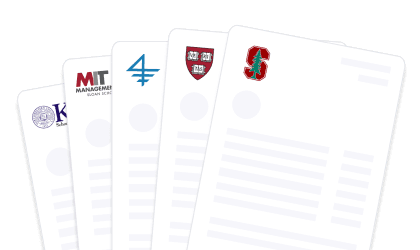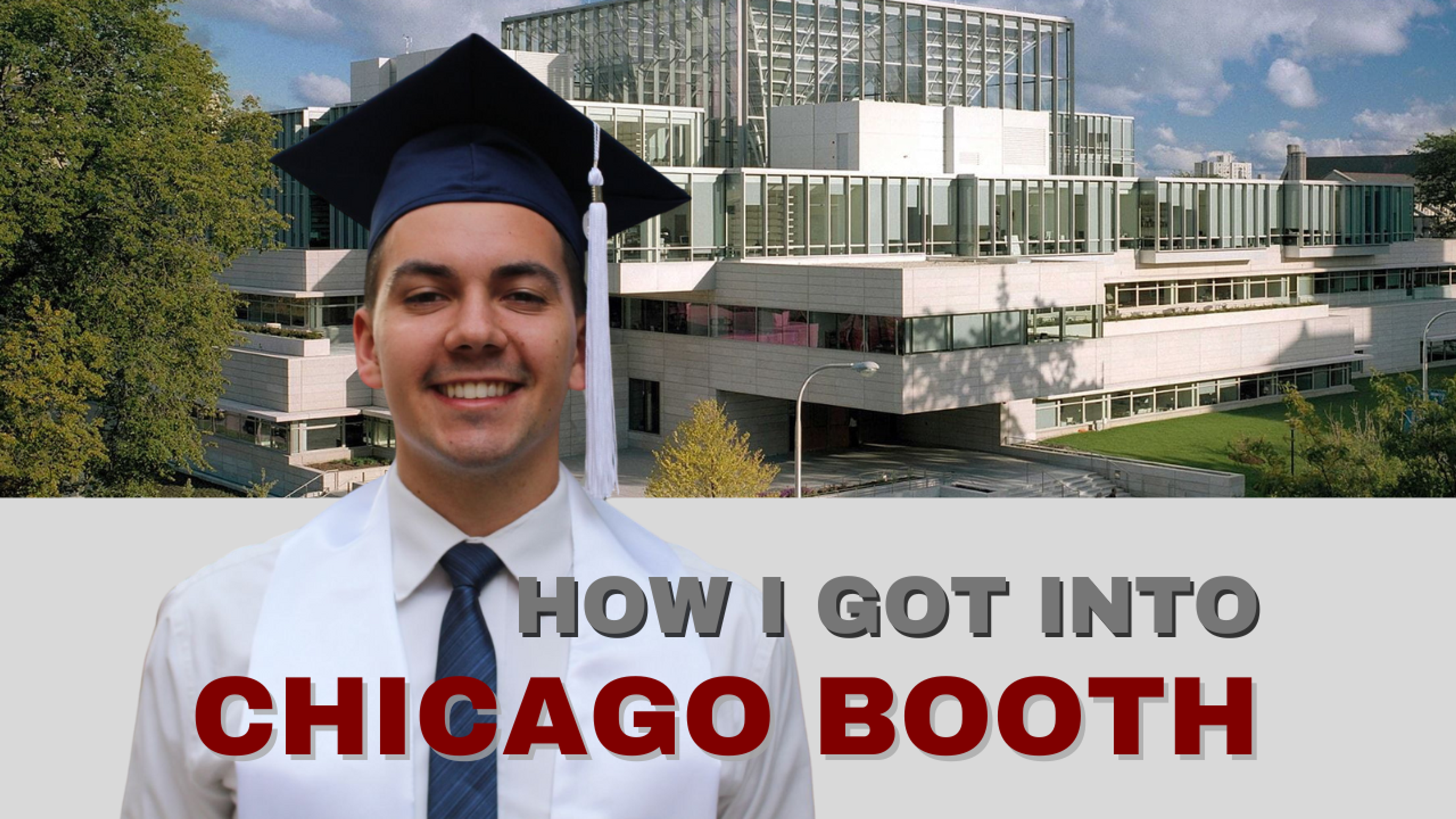Deferred MBA Application: Requirements, Process, & Expert Tips
In this comprehensive expert guide, Coach Austin P. delves into the intricacies of the deferred MBA process and sheds light on the top programs that offer this unique opportunity.

By Austin P.
Personalized deferred MBA coaching | Consulting and STEM candidates
Posted June 13, 2025

Join a free event
Learn from top coaches and industry experts in live, interactive sessions you can join for free.
Table of Contents
The past few years have seen a marked increase in interest from graduating college students who are interested in gaining acceptance into the top deferred MBA programs in the country – HBS 2+2, Penn Wharton Advance Access, and MIT Sloan Early Admission just to name a few of many. After getting into two of the top five MBA programs in the country through deferred admission myself and starting my coaching journey with Leland, I have come to understand the admissions process very well. Below, I paint a
clearer picture of the deferred MBA journey and answer your most pressing questions so you can feel more comfortable starting the process!
What Are Deferred MBA Programs?
Deferred MBA programs are as the name implies: get accepted now in your last semester of college for a spot in a school’s full-time MBA program anywhere between 2 and 5 years in the future. Committing to one of these programs means that you can dedicate your first few years of work experience to learning, taking risks, and improving your leadership acumen, rather than spending your time studying for the GMAT or looking for exits.
These programs are not just for people from traditional academic backgrounds going into banking or consulting. While these profiles do account for a fair amount of admits, students regularly gain admission into top deferred MBA programs from non-traditional backgrounds. Whether you studied music, economics, or anything in between, you should apply if you have a vision for using a top-tier MBA as a leadership catapult in your career.
All M7 programs offer deferred MBA programs; for a list of the best schools with deadlines, acceptance rates, and more, see: Top 10 Deferred MBA Programs in the US—and How to Get In.
Deferred MBA Application Requirements
GRE/GMAT Score
Although some schools will accept standardized test waivers in rare circumstances, putting your best foot forward with a strong GMAT or GRE score is a great indicator of your aptitude for the admissions committees.
There is a common misconception that the GRE is an easier test, so admissions officers look down on applicants who submit a GRE score. This is not true! The GRE accounts for over 1/3 of the standardized test scores that accepted students give at top programs, and that number is only growing!
- My suggestion: Find out which test you are better at before choosing which one you want to study for. For me, the GRE was a better fit because I felt the math was more straightforward. For others, the GMAT might be easier because of the emphasis on grammar.
Read: GMAT vs. GRE: Which to Take and How to Ace Both
GPA
A high undergraduate GPA can indicate your commitment to academic excellence, a common strong point of successful applicants. Don't disqualify yourself if your GPA isn't as high as you'd want it to be. As much as it’s easy to not believe, there are SO many applicants who make up for a low GPA with great GMAT/GRE scores, inspiring essays, and game-changing interview performances. In fact, many people with off-the-charts GPAs don’t even get interview invites because of this!
- My suggestion: As you approach the time to submit applications, ensure your grades are on an upward trend. Even better, if you are a non-business major, consider taking elective coursework in the realm of finance, marketing, or economics to demonstrate interest in business concepts. Schools like MIT Sloan even ask if you have taken organizational behavior or management courses on the application.
Essays
This process is much more than just the numbers. I argue that essays are one of the most central and essential pieces of an admissions officer’s decision to grant you an interview or admission. There is nothing more powerful than essays that exude the drive and inspiration to change the world for the better, be a ground-breaking leader, or improve the lives of others through business. An uninspired “I want to be a consultant” essay likely won’t cut it. A comprehensive, compelling, and realistic vision of your future impact is what’s needed here.
- My suggestions:
- The goal of your essays should be to make it hard for your application reviewer to just skim; be your authentic self and be clear about why deferred admission will help you get where you want to be!
- Take time to reflect on the aspects of your past that inspire your aspirations. Did you discover a professional passion for bringing technology to underserved communities through your volunteer work? Did growing a business from the ground up at school unlock a passion of yours to become a serial entrepreneur? Did in-depth conversations on management theory with your economics professor unlock a want for you to implement strategy in the consulting world?
Read: How to Write a Powerful MBA Essay—With Examples
Letters of Recommendation
Most programs will have you submit two letters of recommendation – one of which should be from a supervisor, whether that be through an internship, volunteering, or something of the like. Along with answering a few questions in written form, your recommender will also have to fill out a short survey answering questions about your aptitude, teamwork capabilities, and leadership potential. By choosing recommenders who know your strengths well, you can ensure your recommendation letters fit nicely with the person you portray in the rest of your application. A misalignment of the person portrayed in a recommendation letter and the person you put forward in your application can be a red flag for admissions reviewers.
- My suggestion: Build and maintain great relationships with potential recommenders. By being vulnerable with mentors and supervisors, you can build relationships based on growth and trust. A recommender that can share specific examples of times you have shown fantastic leadership potential and overcome adversity is what you are looking for.
Read: How to Get the Perfect MBA Letter of Recommendation—With Examples
Interviews
Receiving an interview invite is a positive sign of interest from an admissions committee. Interview invites are sent out a few weeks after the application submission deadline and are opportunities for admissions committee members or alumni to further understand your background and interest in a deferred MBA. Post-interview acceptance rates vary by program, but programs like HBS 2+2, Stanford GSB Deferred Enrollment, and MIT Sloan Early Admission accept anywhere between 30-50% of interviewees.
- My suggestion: Network, network, network before interviews! By gaining knowledge on these MBA programs from current students, you can demonstrate your interest to your interviewer in a way that is genuine and compelling.
Read: How to Ace Your MBA Interview: With Prep Questions & Answers
Success Factors of Admitted Applicants
- A Realistic Story: AdComs read thousands of applications each year, and they can sense an embellished application from a mile away. Sure, your essay to the HBS 2+2 program will be inspiring, but does it fit with your profile? Successful applicants write essays that mesh nicely with their past or current area of study, volunteer or club work, or internship experiences. If you are writing about your vision to be the eventual founder of a renewable energy startup, you should be able to point to the experiences of your past that have engendered your interest in the industry. If you are writing about your want to become a leader in the impact investing club on campus, you should be able to point to your strengths at the intersection of finance and social impact.
- Demonstrated Interest in Specific Programs: Admissions offices often keep track, and ask on applications, if you have been to admissions events. Successful applicants often go to admissions events to signify interest in a program and to gain an understanding of the intricacies of a school. By doing this, they can better speak to “Why this school” in interviews and essays. Conveniently, all of the top deferred admission programs hold many on-campus and online sessions for you to attend!
- A Great “Why Deferred MBA” Answer: At the end of the day, the admissions committee needs to feel good about making an investment in you. They need to believe that you, with no full-time work experience, will be a good fit for one of the most prestigious MBA programs filled with hugely successful professionals. Successful applicants are clear as to how an MBA can help them achieve their long-term vision – making AdComs comfortable with granting them admission.
Read: Top 25 Business Schools' Acceptance Rates & Class Profiles (2023)
Wrapping it All Up
For graduating college students, the opportunity to have a spot in a top MBA program years in advance cannot be understated. By starting early, being diligent, and keeping a positive mindset, you will be able to bring your best self through in your applications and interviews.
Schedule a FREE intro call with Coach Austin P. now!
Read these next:

Written by Austin
5.0
(4)
Welcome! I am Austin, from the suburbs of Chicago, Illinois. I work in strategy consulting at L.E.K. Consulting, and come from a STEM background!
Austin has helped clients get into organizations like:
Browse hundreds of expert coaches
Leland coaches have helped thousands of people achieve their goals. A dedicated mentor can make all the difference.


























